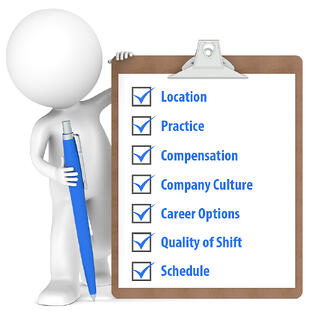 Top 7 Factors Emergency Medicine Residents Consider in a New Practice
Top 7 Factors Emergency Medicine Residents Consider in a New Practice
According to the Emergency Medicine Residents' Association, (EMRA), 70% of Emergency Medicine residency graduates will leave their first job with the first two years.1 Why is this? According to EMRA this is due to a lack of clear cut career and personal goals during the initial job search.
Below is a list of the most commonly discussed concerns/factors that emergency medicine residents consider in their job search. No one can tell you how these factors will rank in order of importance for you, but it’s critical that you give them each serious consideration before and during your job search.
-
Location – Where do you want to be? Maybe you attended residency far from home and are looking for an opportunity to move closer to family…or you have always dreamed of living in a particular city and see this as your chance. Finding a full-time job in the exact ED you are looking for may not always be an option, so determine a comfortable radius around your ideal location where you can work and still maintain the original benefits of practicing in that area.
- Practice– What type of practice setting are you looking for? Opportunities can vary from hospital employee to democratic group to independent contractor. Each practice type has very different pros and cons, and should be evaluated closely from a personal, as well as, financial perspective.
- Compensation – The way your compensation is determined can vary drastically from
practice to practice, so reviewing the details closely before signing any agreement is critical. Will you be paid a set hourly rate or measured based on your productivity? How about professional liability insurance? Is tail included? As for benefits, will you be employed or an independent contractor?
- Company Culture – Always make time for a shadow shift when interviewing with a potential practice. This will give you greater insight into how the practice functions on a day-to-day basis and how you will fit in. Talk to other physicians and note how they work together.
- Career Options – Are you looking for a practice where you can advance in your career through ownership/partnership opportunities? Maybe you are content with just completing your shifts and heading home. There is no right or wrong path, but being knowledgeable about your future options within an emergency medicine practice can help alleviate surprises down the road.
- Quality of Shift – What tools are available to assist you during your shift? Know your preferences for completing charts, available EMR systems, availability of scribes and other support staff.
-
Schedule – Knowing how a schedule is prepared can be helpful in your decision-making process. How many hours is considered full-time? Are you required to work a set number of weekends? What is the process for requesting shifts or particular days off? Is there dedicated paid vacation?
Through their studies, EMRA has found that residents who make factors relating to a practice’s company culture and practice profile their #1 priority and determine clear cut career and personal goals during their initial job search will ultimately be happier in their position. Other factors that lead to longevity: being married with children and family ties to the area.
Interested in discovering more tips for acing your next interview? Follow our blog series: The Keys to Successful Emergency Medicine Physician Interviewing
Source: EMRA - Preparing for the Real World: An Interviewing Guide of EM Residents



